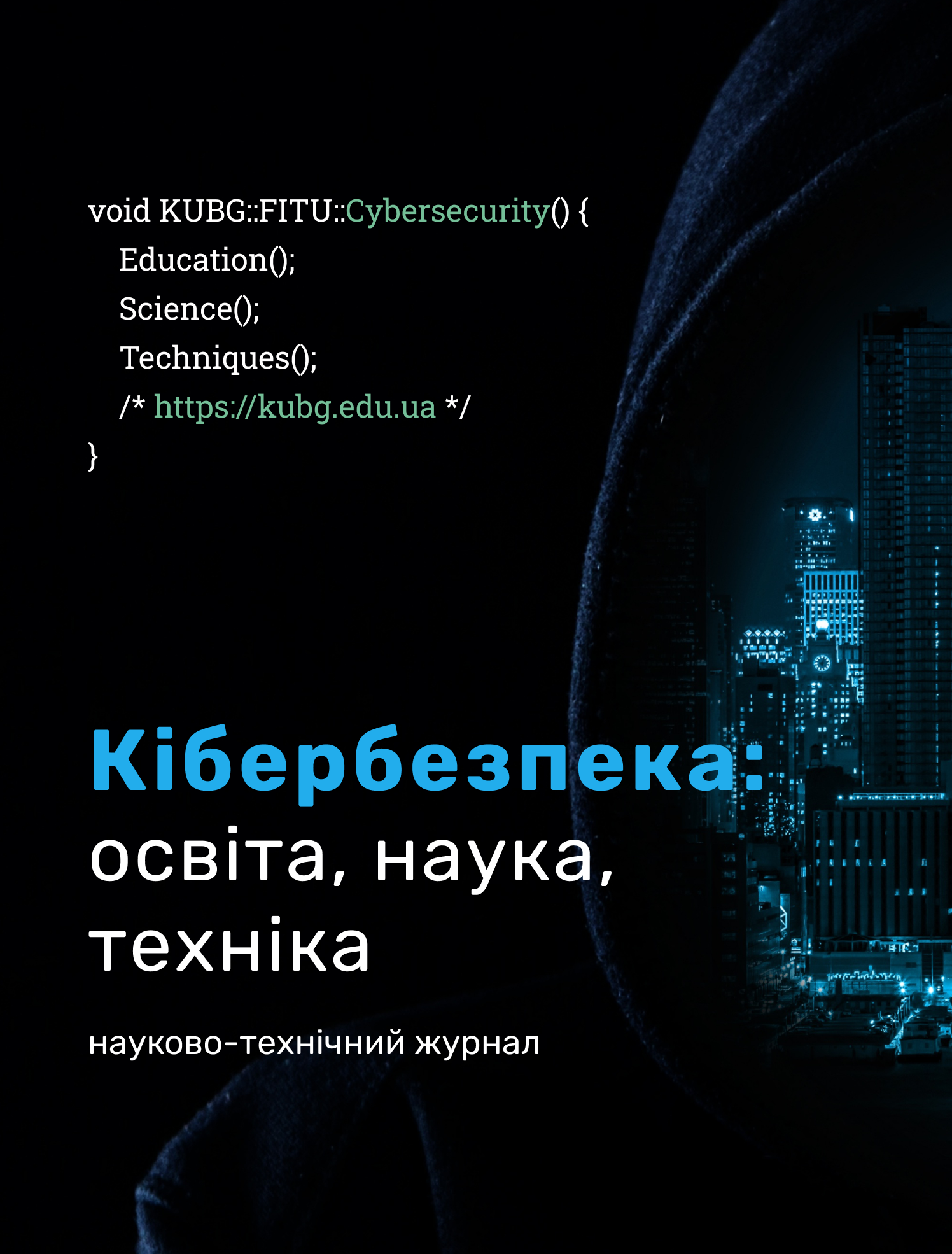ОСОБЛИВОСТІ СУЧАСНОГО ПОНЯТІЙНО-ТЕРМІНОЛОГІЧНОГО АПАРАТУ У СФЕРІ ПІДГОТОВКИ ФАХІВЦІВ З КІБЕРБЕЗПЕКИ
DOI:
https://doi.org/10.28925/2663-4023.2024.23.171181Ключові слова:
кібербезпека, інформаційна безпека, цифрове суспільство, кіберосвіта, інформаційні технологіїАнотація
У статті досліджено актуальність забезпечення сталого розвитку якісної кібербезпеки країни як основної складової сучасного цифрового суспільства. Вивчено ключові напрямки підготовки кадрів органів кібербезпеки України. Проаналізовано основні нормативно-правові акти, які регулюють систему освітньої підготовки фахівців в області кібербезпеки. Загально охарактеризовано систему освіти підготовки кадрів в області кібербезпеки і зіставлено її із головними елементами загальної системи освіти України. Розглянуто теоретичні нюанси процесу створення системи професійної підготовки фахівців із кібербезпеки, встановлено її основні риси, перспективи та функціонування на теперішній час. Запропоновано узагальнене поняття системи підготовки кадрів у сфері кібербезпеки, як комплекс елементів освітньої діяльності, мета яких полягає у реалізації та забезпеченні сталого розвитку цифрового суспільства шляхом підготовки необхідного обсягу кадрів в області кібербезпеки країни. На основі наукових напрацювань вітчизняних та зарубіжних вчених у галузі освіти, окреслено новітні освітні елементи та поняття у процесі сучасної освіти. Розкрито та обумовлено співвідношення таких понять, як «інформаційна безпека» та «кібербезпека», шляхом деталізації їх основних складових. Проаналізовано визначення кібербезпеки у стратегіях кіберберпеки провідних країн світу та співставлено його із визначенням, наведеним у національній стратегії кібербезпеки України. Запропоновано бачення автора дефініції «кібербезпека» на основі дослідженої наукової літератури та офіційних документів, з урахуванням комунікативних, соціологічних та політичних аспектів. Досліджено низку наукових напрацювань сфери кібер- та інформаційної безпеки задля узагальнення сутності визначення «фахівець із кібезбезпеки». Зроблено висновок щодо важливості належного функціонування системи підготовки кваліфікованих кадрів сфери кібербезпеки. Запропоновано зробити детальніше дослідження процесу самої підготовки кадрів та концептуальних основ організації освітньої діяльності на прикладі інших країн світу.
Завантаження
Посилання
Melnyk, S. (2016). Conceptual-categorical apparatus in the system of professional training of future experts of information and cyber security. Information Technologies and Learning Tools, 55(5), 187–197. https://doi.org/10.33407/itlt.v55i5.1497
Cyber security as an important component of the entire system of state protection. (2018). Ministry of Defence Ukraine. https://www.mil.gov.ua/ukbs/kiberbezpeka-yak-vazhliva-skladova-vsiei-sistemi-zahistu-derzhavi.html
Diorditsa, I. (2017). The cyber security system: Essence and purpose. Pidpryiemnytstvo, hospodarstvo i pravo, (7), 109–116.
Melnyk, S., Tikhomirov, O., & Leskov, O. (2011). To the problem of formation of the conceptual and terminological apparatus of cyber security. Collection of scientific works of Taras Shevchenko Kyiv national University, (30), 165–172.
Kormych, B., (2004) Legal and organizational basis of the policy of information security of Ukraine. [The studies for the degree of doctor of legal Sciences spec.: 12.00.07].
Maksymenko, Y., (2007). Theoretical-legal bases of ensuring of information security of Ukraine. [Thesis of the Candidate of Legal Sciences: 12.00.01].
Baranov O., (2014). On the interpretation and definition of “cybersecurity”. Legal Informatics, (2), 54–62.
Skrypnyk, L., (2013) Regarding of cybersecurity. STSZI, (2), 126–130.
On the decision of the National Security and Defense Council of Ukraine dated January 27, 2016 “On the Cybersecurity Strategy of Ukraine”, Decree of the President of Ukraine № 96/2016 (2016) (Ukraine).
On the decision of the National Security and Defense Council of Ukraine dated May 14, 2021 “On the Cybersecurity Strategy of Ukraine”, Decree of the President of Ukraine № 447/2021 (2021) (Ukraine).
On the main principles of ensuring cyber security of Ukraine, Law of Ukraine № 2163-VІІІ (2017) (Ukraine).
On approval of the 2018 action plan for the implementation of the Cybersecurity Strategy of Ukraine, order of the Cabinet of Ministers of Ukraine № 481-p (2018) (Ukraine).
On education, Law of Ukraine № 2145-VIІІ (2017) (Ukraine).
Danyk, Yu., & Zinchenko, A. (2018). Cyber education and its features. Military Education, (2), 67–84. https://doi.org/10.33099/2617-1783/2018-2/67-84
Canada’s cyber security strategy: For a stronger and more prosperous canada. (2010). Government of Canada. https://www.publicsafety.gc.ca/cnt/rsrcs/pblctns/archive-cbr-scrt-strtgy/archive-index-en.aspx
Information systems defence and security: France’s strategy. (2013). French Network and Information Security Agency. https://www.vie-publique.fr/rapport/33131-livre-blanc-sur-la-defense-et-la-securite-nationale-2013
Cybersicherheitsstrategie für Deutschland 2021. (2021). Bundesministerium des Innern und für Heimat. https://www.bmi.bund.de/SharedDocs/downloads/DE/veroeffentlichungen/2021/09/cybersicherheitsstrategie-2021.html
The Netherlands cybersecurity strategy 2022-2028. (2022). National Coordinator for Counterterrorism and Security. https://english.nctv.nl/documents/publications/2022/12/06/the-netherlands-cybersecurity-strategy-2022-2028
Stubley, D. (2013). What is cyber security? 7elements. https://www.7elements.co.uk/resources/blog%20/what-is-cyber-security/
Franscella, J. (2013). Cybersecurity vs. cyber security: When, why and how to use the term. SecurityWeek. http://www.infosecisland.com/blogview/23287-Cybersecurity-vsCyber-Security-When-Why-and-How-to-Use-the-Term.html
Dovgan, O., & Doronin, I. (2017). Escalation of cyber threats to the national interests of Ukraine and legal aspects of cyber protection. Publishing house «ArtEk».
With the support of the Ministry of Digital Affairs, a free training program for cyber security specialists will be launched. (2023). Government portal. https://www.kmu.gov.ua/news/za-pidtrymky-mintsyfry-startuie-prohrama-bezoplatnoho-navchannia-spetsialistiv-z-kiberbezpeky
About the Implementation Plan of the Cybersecurity Strategy of Ukraine, the decision of the National Security and Defense Council of Ukraine (2021).
Baranovskyi, O. (2021). Cyber professionals for the state in the 21st century. National cyber security cluster. https://cybersecuritycluster.org.ua/blog/kiberprofesionaly-dlya-derzhavy-v-hhi-stolitti/
Zhora, V. (2023). Cybersecurity needs staff: Why government and business should work together. ECONOMIC TRUTH. https://www.epravda.com.ua/columns/2023/02/27/697467/
Veselova, L. (2021). Administrative and legal foundations of cyber security in conditions of hybrid warfare [Thesis of the degree of doctor of Legal Sciences: 12.00.07] Odessa State University of Internal Affairs.
Jalladova, I. A. (2015). Information security policy: Scientific and applied aspects and problems of training specialists. Modeling and information systems in the economy, (91), 57–75.
Bystrova, B. (2018). Professional training of bachelors in cyber security in higher educational institutions of the USA [Thesis of the Candidate of Pedagogical Sciences: 13.00.04] Institute of Pedagogical Education and Adult Education of the National Academy of Pedagogical Sciences of Ukraine.
Arsenovych, L. (2022). Conceptual and categorical apparatus in the field of training specialists in cyber security of state authorities of Ukraine. Scientific perspectives, (2), 33–53.
Опубліковано
Як цитувати
Номер
Розділ
Ліцензія
Авторське право (c) 2024 Сергій Горліченко

Ця робота ліцензується відповідно до Creative Commons Attribution-NonCommercial-ShareAlike 4.0 International License.




